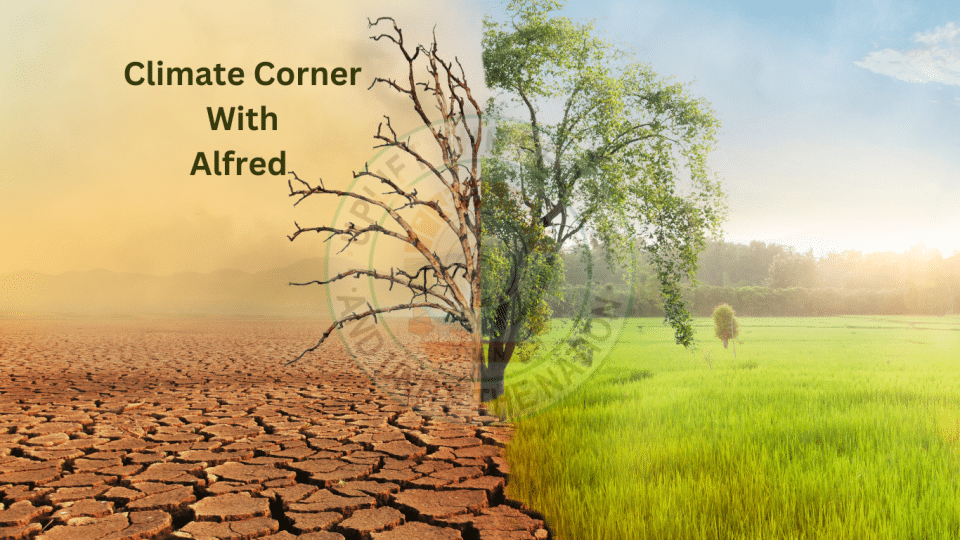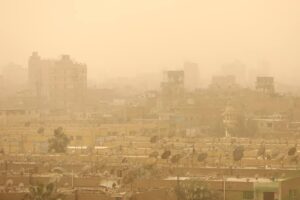Africa Struggles with Devastating Climate Change Impacts

Climate change is undermining Africa’s development despite recent advancements in weather forecasting technology and increased awareness about disaster management and preparedness efforts.
Over the past two years, Africa has experienced several deadly weather-related disasters that are severely impacting development across the continent.
Bon Henson and Jeff Masters, from the United Nations Office for Disaster Risk Reduction’s (UNDRR) Prevention Web, have emphasised that climate change operates within a social and ecological context.
They argue that changes in ecosystems, housing patterns, and infrastructure can exacerbate the risks of climate change by increasing vulnerability to extreme weather events.
Initially, the Libyan Red Crescent reported 11,300 deaths, a figure later reduced to 3,958 deaths by the World Health Organisation.
An article published on September 13, 2023, by Storm Daniel titled “The Libya Floods: A Climate and Infrastructure Catastrophe” suggests that poor maintenance of the Derna-area dams may have heightened the catastrophe’s risk.
Despite warnings from Libya’s meteorological agency, which issued alerts three days in advance, and a state of emergency declaration for parts of eastern Libya by the World Meteorological Organisation, the recommendations from a 2022 research study by civil engineer Abdelwanees A. R. Ashoor on the city’s flood-prone landscape were not heeded.
This highlights the general inability of many African nations to effectively manage the impact of climate change-induced disasters.
Algeria was previously hit by approximately 35 wildfires that have spread across more than 11 regions since July 24, resulting in extensive devastation.
The wildfires affected 6,000 families, heavily reliant on crops and livestock, resulting in over 34 confirmed deaths, numerous displaced individuals, and thousands of injuries.
Relief Web reported that the impact of forest fires in Algeria has been steadily increasing due to drought and heatwaves caused by climate change, with the fires in August 2022 claiming at least 43 lives and injuring 200 others.
On September 8, 2023, Morocco experienced a devastating 6.8-magnitude earthquake that led to mass casualties in mountain villages. The earthquake, described as the strongest in a century by the country’s Geophysical Institute, resulted in nearly 3,000 deaths and 5,600 injuries, according to figures reported by Al Jazeera on September 18th.
Cyclone Freddy
Cyclone Freddy made landfall in Mozambique in March 2022 as a Category 2 storm with 110 mph winds, causing floods that claimed the lives of 1,434 people. Freddy surpassed Cyclone Idai in 2019 as Africa’s deadliest tropical cyclone on record. It is now the second-deadliest tropical cyclone in the entire Southern Hemisphere, after an unnamed 1973 cyclone in Indonesia that killed 1,650 people.
Between April and May, severe floods in the Democratic Republic of Congo (DRC) and Rwanda led to the deaths of at least 574 people, the displacement of thousands, and the disappearance of many. In 2022, a drought in Uganda resulted in 2,465 deaths, while flooding in South Africa claimed the lives of 544 individuals.
According to a February 2023 study by the London School of Hygiene & Tropical Medicine, the most severe drought in Somalia resulted in over 43,000 deaths, with half of the victims being children under the age of five. This revelation underscores the urgent need for action across the continent.
2022 flood disaster affected 8.2 million people in 20 countries.
An update on the 2022 flood disaster in West and Central Africa revealed that the incidents, the worst in years, affected 8.2 million people in 20 countries.
Heavy rains and floods led to the deaths of 1,418 people, injuries to 4,398, and the displacement of 2.9 million individuals.
Nigeria, Chad, the Democratic Republic of Congo, the Republic of Congo, Niger, Cameroon, the Central African Republic, Liberia, and others were severely impacted, with 513,000 houses either totally or partially destroyed in the region.
Several analyses from the World Weather Attribution Group (WWA) have linked drought and extreme flooding in Africa and other parts of the world to climate change.
WWA concluded that climate change has made events like the current drought in East Africa about 100 times more likely.
In May 2022, a study on the South African floods of 2022, which resulted in 544 deaths, attributed the increased rainfall to greenhouse gas and aerosol emissions. Another study on the summer 2022 floods in West Africa, which claimed 876 lives, concluded that human-caused climate change made the event about 80 times more likely and approximately 20% more intense.
The EU’s climate monitoring service, Copernicus, noted that rising global sea surface temperatures are causing record levels of heat worldwide, with 2023 likely to be the warmest year in human history. A 2023 report from the United Nations Office for Disaster Risk Reduction highlighted that between 2015 and 2021, disasters cost Africa 12.3% of its GDP, resulting in significant economic losses and disruptions to national, regional, and international markets.
According to the Intergovernmental Panel on Climate Change (IPCC), Africa has suffered widespread losses and damages due to human-induced climate change, including biodiversity loss, water shortages, reduced food production, loss of life, and decreased economic growth.
The IPCC’s 2022 report projected a challenging future with increased occurrences of extreme weather conditions such as heatwaves, droughts, and heavy precipitation events.
The report warned that most African countries would experience unprecedented high-temperature climates earlier than wealthier, higher latitude countries, emphasising the urgency of adaptation measures in Africa.
Climate change is an existential issue
Climate change is an existential issue, and how it is managed will shape the future for present and future generations.
African governments and people must take decisive actions before reaching tipping points.
The time to act is now!









